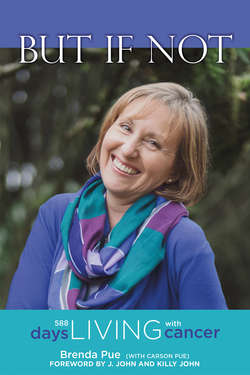Читать книгу But If Not - Carson Pue - Страница 6
На сайте Литреса книга снята с продажи.
ОглавлениеForeword
Let us encourage you to read this book from our friend Brenda Pue. As you will have already appreciated, this book is, at one level, an account of one woman’s battle with cancer. Yet at a much deeper, truer level, it is not about death or dying; it is about life and living. In this book “life in all its fullness”—the sort that Jesus promises in John 10:10—leaps and bounds off every page. We were privileged to know Brenda, and the word “vibrant” (“pulsing or throbbing with energy or activity” says one dictionary) could have been invented for her. This collection of blogs and reminiscences of her last year and a half conveys exactly that aspect of her character.
We want to encourage you to read it because we live in a time when a book like this is astonishingly relevant and helpful. The first (and possibly most harmful) lie we hear as children is “and they lived happily ever after.” Our modern culture likes to pretend that living “happily ever after” is not just possible but also a right. The fact of our mortality is denied to the point that when, inevitably, we come face to face with death, we can find ourselves confused and dismayed. Of course, for the follower of Christ there is the certain hope of eternal life, but the fact is that our lives—like any book or film—must at some point have an ending. This failure to come to terms with death and dying means that we can find ourselves astonishingly ill-equipped to consider the prospect of the end of our days.
This book is a healthy antidote to the failure of our culture to acknowledge our finite lifespan. And indeed “healthy” is the word. All the things you might expect to read in an account of 18 months’ worth of ups and downs with cancer are missing. So there is no mawkish sentimentality, no bitterness, no recriminations and no desperate bargaining with God for extra time. Yes, there are prayers for healing, but there is the acceptance that this is in the Lord’s hands, and when healing doesn’t come there is no raging against God, only a contented acceptance of his will. And equally, there is neither a naive trivialization of death nor any glib triumphalism. What one is most struck by in this account is how, in the face of the unpleasant realities, Brenda displays a sense of peace and joy and delight in God’s good gifts of faith, family and friends. It is no cliché to say that this book is both life affirming and death defying.
Brenda was a remarkable woman, and it is not surprising that her account of her last days is equally remarkable. We want to suggest that this written legacy is a privilege, a blessing and a challenge.
First, this account is a privilege. We are, as it were, invited in to be alongside Brenda, her family and many friends as they struggle together with her illness. This is deeply helpful. It is easy to talk about suffering in the abstract, as a problem for philosophy and a challenge to theology. Yet we do not experience suffering as a theoretical element in some academic debate; we experience it as a painful, life-shaking event. Here, however, we are involved in the solid realities of a chronic illness: of encouraging and discouraging medical results; of the bittersweet nature of birthdays, holidays and family gatherings under the shadow of parting; and of the trials of busy lives thrown into disarray by illness. Here we read of real faith in the midst of the severest of trials.
Second, this account is a blessing. “Where, O death, is your victory? Where, O death, is your sting?” writes the apostle Paul in 1 Corinthians 15:55 (NIV). Yet for many people intimidated by the looming prospect of life’s end, Paul’s words can seem to be the ultimate example of whistling in the dark. For a lot of people, the prospect of dying overshadows the business of living. Every birthday, every obituary heard or read, comes as a menacing nudge that one day our time will come. Here, however, Brenda’s faith allows her to rejoice deeply and genuinely; in the midst of it all, she enjoys life. For Brenda there is sunlight in the valley of the shadow of death. This book is not about dying with cancer; it is about living with it.
Third, this account is a challenge. Brenda writes, “I have chosen to live life with faith.” It’s a phrase well worth pondering on. Brenda’s life was one well lived with God. In her life she was an enormous help and encouragement to many, and as her legacy this book extends that influence. This book challenges us to think about our own deaths. Would we—will we—face our end with such radiant hope? But oddly enough this account is also a challenge to how we live. In this book we see open, almost outrageous, happiness and delight in the pleasures of life. There is deep rejoicing in little things in family, friends and fellowship. There is, too, a rich joy and hope in the reading of Scripture. In her dying, Brenda seems more alive than many of us in our living.
You often hear it said that someone “lost the battle with cancer.” To read this book is not to read of any lost battle. In fact, to read it is to learn of a victory. This account sounds a splendid and defiant note of triumph. In her life Brenda was a woman who inspired many. We have found this account of her last days on this earth no less inspiring. May it be so for you.
J. John and Killy John
